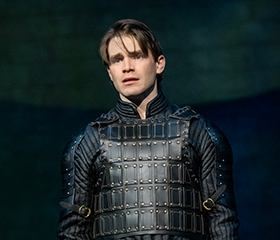Most actors spend anywhere from 15 minutes to an hour every night preparing themselves to set foot on stage. Andrew Burnap, who plays Arthur in Camelot, is no different. He told me recently that his warm-up is physical, emotional, and vocal. “I get my heart rate going,” he said. “I do some singing. I meditate for five to ten minutes. I try to focus, to prepare myself to be taken away by the story we’re about to tell.”
But at the begin of Camelot’s run, Burnap confessed, his well-balanced warm-up didn’t always provide sufficient confidence. “I sing the first musical number – ‘I Wonder What the King is Doing Tonight.’ And I sometimes struggled. I wasn’t giving in to the feeling the song conveys, which is hesitation. Arthur is asking himself whether he’s up to being king.” Burnap went on: “I began to realize that what the king is experiencing at that moment parallels what I as an actor am going through. I’m asking myself whether I’m up to doing a performance for the next three hours. It was only when I gained confidence as both actor and king that I could give in to the feeling and give the song what it deserved.”
Showing how the king gains confidence isn’t the only arc Burnap traces as Arthur. “One of my former colleagues,” the actor said, “came to the show and told me, ‘You have to go from doing a romantic comedy in the first act to doing Henry V in the second act.’ I thought that was an astute comment. And during the run I have been thinking about Henry IV and Henry V. I’ve wondered what it would be like to play Prince Hal to Dakin’s Falstaff.” (Dakin Matthews plays Merlyn and Pellinore in Camelot.) “So I asked Dakin, ‘How many times have you played Falstaff?’ He replied, ‘Too many.’” Burnap laughed. “There went that dream.”
Burnap said that he likes playing the reluctant hero. (We shall probably see some of that archetype in Disney’s upcoming live-action remake of Snow White, in which he plays a Robin Hood type character called Jonathan.) “The reluctant hero,” Burnap said, “gives a character an inherent arc, a place from which to evolve. And there is usually humor in his stumbles along the way.”
Burnap showed his comic chops in Matthew Lopez’s The Inheritance, for which he won a Tony award for Leading Actor in a Play. And he is extremely adept at the slight sarcasm of Aaron Sorkin’s Camelot dialogue – Arthur may not know how to handle a woman but Andrew knows how to handle a comeback. But it would be a mistake to think Burnap is better at the role’s spoken demands than at its sung ones. Burnap is modest about these matters. “I haven’t studied singing as much as I’ve studied acting,” he said, though for Camelot he’s been working with the doyenne of New York vocal coaches: Joan Lader. “But I can carry a tune.”
Burnap’s path to performing did, in fact, come through music. During his childhood in Rhode Island, he was a boy soprano. At age 8, he took part in an annual choral event. “As part of the show,” Burnap said, “a great green horse entered the hall. I remember being terrified but instead of shying away from that kind of experience I told myself: I want to make people feel the kind of emotion that I just felt when I was scared. So I got the acting bug and the next year I auditioned for a play.”
Spurred on to study acting at the University of Rhode Island, where he did Benedict in Much Ado About Nothing (I wish I’d seen that), he continued his Bardic studies at Yale, where he was Malcolm in the Scottish play. But it’s a line from The Winter’s Tale that provides his favorite Shakespeare inspiration. Burnap explained: “It’s Paulina, I think. She says: ‘It is required you do awake your faith.’ The awakening is not optional: it is required. That’s what I like. And awakening our own faith and the audience’s faith is what we do every night in Camelot.”
Brendan Lemon is a freelance journalist in New York.
